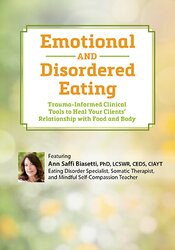
×

When your clients struggle with eating, your first move as a therapist may be to develop plans for specific behavioral changes - a list of things clients can do instead of reaching for the fork or limiting food intake.
But these efforts won’t work over the long term. Emotional eating – and the eating disorders it can become – is rooted in nervous system dysregulation and disembodiment that behavior change strategies alone won’t shift.
The body needs to be included for treatment to be effective. Without it, disembodiment will continue, keeping your clients stuck in the cycle of disordered eating and losing hope in your work with them.
Join Ann Saffi Biasetti, PhD, LCSWR, CEDS, specialist in eating disorders and somatic psychotherapy, for this in-depth training where you’ll discover how to integrate the body in treatment in a way that fosters real change in your clients’ relationships with food and their bodies!
Packed with practical interventions, this comprehensive seminar will provide you with strategies to:
Register today to help clients manage what is happening on the inside to build resilience, improve emotion regulation, and establish a new compassionate and forgiving relationship with their body!
All members of the PESI, Inc. planning committee have provided disclosures of financial relationships with ineligible organizations and any relevant non-financial relationships prior to planning content for this activity. None of the committee members had relevant financial relationships with ineligible companies or other potentially biasing relationships to disclose to learners. For speaker disclosures, please see the faculty biography.
Continuing education credit information is coming soon for this live webcast.

Ann Saffi Biasetti, PhD, LCSWR, CEDS, CIAYT, is a practicing clinician for over 30 years specializing in somatic psychotherapy. She is an eating disorder specialist, certified mindfulness teacher, Mindful Self-Compassion (MSC) teacher, and Certified Yoga Therapist (C-IAYT). Dr. Biasetti teaches in the Self-Compassion in Psychotherapy (SCIP) program, where she shares her expertise in somatic self-compassionate interventions for eating disorders recovery and serves consultation leader. She has led well-received retreats at Kripalu and Shambhala Mountain Center and has led professional training workshops through her Befriending Your Body (BFYB) certification program for eating disorder recovery. She is the author of Befriending Your Body: A Self-Compassionate Approach to Freeing Yourself from Disordered Eating and The Awakening Self-Compassion Card Deck: 52 Practices for Self-Care, Healing and Growth. Dr. Biasetti maintains a private practice in Saratoga Springs, NY.
Speaker Disclosures:
Financial: Dr. Andreana Saffi Biasetti maintains a private practice. She receives a speaking honorarium and recording royalties from PESI, Inc. She has no relevant financial relationships with ineligible organizations.
Non-financial: Dr. Andreana Saffi Biasetti is a member of the Polyvagal Institute, the Academy for Eating Disorders, the International Yoga Therapy Association, the National Association of Social Work, and the Yoga Alliance.
For live CE credit, you must watch the live webcast in its entirety at its scheduled time and complete the CE quiz and evaluation within one week. You will have access for 90 days after the program for review.
Please note: There will be a 70-minute lunch and two 15-minute breaks; one in the morning and one in the afternoon. Lunch and break times will be announced by the speaker and at their discretion. A more detailed schedule is available upon request.
Visit our FAQ page at https://www.pesicanada.ca/faq or contact us at https://www.pesicanada.ca/contact-us.
| 5 |
|
| 4 |
|
| 3 |
|
| 2 |
|
| 1 |
|
Satisfaction Guarantee
Your satisfaction is our goal and our guarantee. Concerns should be addressed to info@pesicanada.com.
Please wait ...